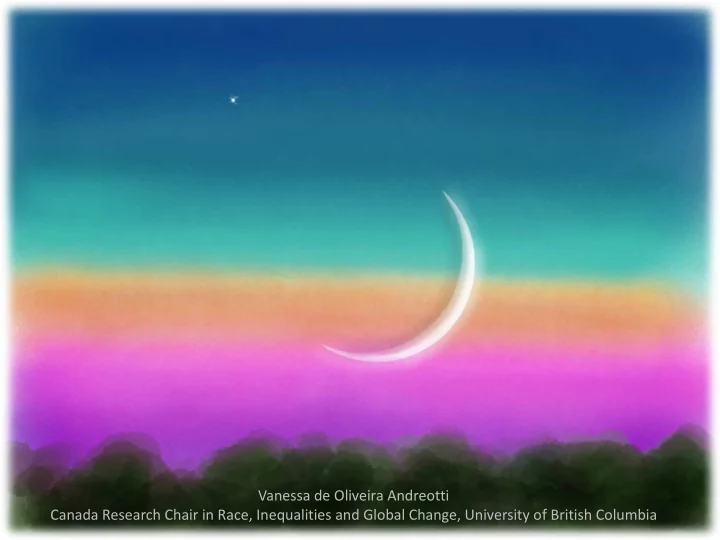

Vanessa de Oliveira Andreotti Canada Research Chair in Race, Inequalities and Global Change, University of British Columbia
1. How can we hospice a dying way of knowing/being and assist with the birth of something new, still fragile, undefined and 7 questions potentially (but not necessarily) wiser? 2. How can we tap the possibilities that are viable but unintelligible within the dominant paradigm? (How to invite people to consider what is deemed “impossible”?) 3. How can we engage and be taught by different systems of knowledge and being, struggles and attempts to create alternatives, (a)cutely aware of their gifts, limitations, ignorances and contradictions?
4. How can we face and start to heal our collective pain without guilt, paralysis, entitlement and drama? 5. What can engender a stream of 7 questions connections not dependent on convictions, knowledge, identity or understanding? (What can bring people together when they don’t have anything “storied” in common?) 6. What can activate a sense of care and commitment to everything that overrides self-interest and categories of thought? 7. What do the stories we tell and our relationship to them have to do with all this?
the stories we tell, what we want them to do, what they show and what they hide, inquiry where they come from, where they lead us to, how they enable or constrain possibilities for co-existence and change… opening our imaginaries for pedagogy other possible ways to tell stories, other beginnings, endings, framings, other ways of knowing, being, relating, walking… in non non-coercive coercive ways.
ourselves, each other, conflict hosting in the face of complexity, uncertainty, ambivalence asymmetry, vulnerability, incommensurability with courage, humility, sobriety, discernment walking together differently experimentation in a foggy road… listening, engaging, tentatively framing, tools failing, learning, reframing, singing, sharing, stumbling, making mistakes, listening, trying new clothes, getting naked, being undone, laughing, crying, feeling, dancing, resting,…starting all over again.
Not what we don’t imagine as an extension of our knowledge, but what we CANNOT imagine from within our realms of intelligibility (normalized imaginaries). Souza Santos, B. (2007) ‘Beyond abyssal thinking: from global lines to ecologies of knowledges’, Revista Critica de Ciencias Sociais, 80. Available at http://www.eurozine.com/articles/2007-06-29-santos-en.html . Last accessed February 26, 2010.
engagement H egemonic (reinforce/justify status quo) E thnocentric (project one view as universal) A historical (forget historical legacies and complicities) D epoliticized (disregard power inequalities & ideologies) S alvationist/Self-serving (invested in self-congratulatory heroism) U n-complicated (offer ‘feel good’ quick fixes) P aternalistic (waiting for a ‘thank you’) Andreotti, V. (2016). Research and pedagogical notes: The educational challenges of imagining the world differently. Canadian Journal of Development Studies, 37(1), 101-112.
inclusion tokenization (you were brought here so that business can go on as usual) display (you should be available for an equity photograph) debt (you have your place, you should be grateful) burden (your job is to meet all needs) trap (if you articulate a problem, you become the problem) betrayal/cost (your investments must align with ours) “the help” (your body is an extension of our entitlements) Ahmed, S. (2012). On being included: Racism and diversity in institutional life . Durham: Duke University Press.[adaptation]
Andreotti, V., Stein, S., Ahenakew, C., Hunt, D. (2015). Mapping interpretations of decolonization in the context of higher education. Decolonization: Indigeneity, Education & Society, 4(1), 21-40. Beyond Reform To disinvest in the Radical Reform Soft Reform current unsustainable Recognition of epistemological hegemony To make the same world and to walk with To make the same Recognition of ontological hegemony world a lot better by others into the possibility world a little bit better including more people, of new worlds . through personal voices and perspectives transformation and in collective action. (IMAGINE the individual action IMPOSSIBLE) (RETHINK, INCLUDE) (MAKE A DIFFERENCE) Systemic & historical Systemic & historical analyses a step further, Individually focused analyses, multiple realizing false promises analyses, single story, perspectives, self- and contradictions, simple solutions, self- implicating, complex undoing of modern affirming, comfort solutions, discomfort structure of being SAME QUESTIONS, SAME QUESTIONS, DIFFERENT QUESTIONS, SAME ANSWERS DIFFERENT ANSWERS DIFFERENT ANSWERS
Earth CARE Intergenerational Justice Framework 1. ecological justice: focusing on social-ecological integration, food security, soil regeneration and “living well” as opposed to “living better”; 2. cognitive justice: identifying the limits of current paradigms and creating new ‘dispositions of engagement’ with mainstream and alternative knowledge systems and technologies; 3. affective justice: recognizing our collective need for healing from historical and inter-generational trauma, prioritizing collective well-being; 4. relational justice: dismantling divisions caused by inherited social, cultural, economic and epistemological hierarchies that hinder symmetrical relationships; 5. economic justice: analyzing and acting upon the systemic reproduction of inequalities through unjust systems of trade, governance and value production, while identifying viable possibilities for economic dignity; and 6. intergenerational justice: securing relationships and forms of organization that can uphold the health and wellbeing of present and future generations.
Andreotti, V. (2016). Response: The difficulties and paradoxes of interrupting colonial totalitarian logicalities. Philosophy of Education Archive, 284-288.
Linearity to be re-worked [thank you Frances & Shawn!] Follow up work from: Andreotti, V., Biesta, G., Ahenakew, C. (2015). Between the nation and the globe: Education for global mindedness in Finland. Globalisation, Socities and Education, 13(2), 246-259.
‘INCLUDE’ ‘HELP’ ‘DE-CENTER’
Recommend
More recommend